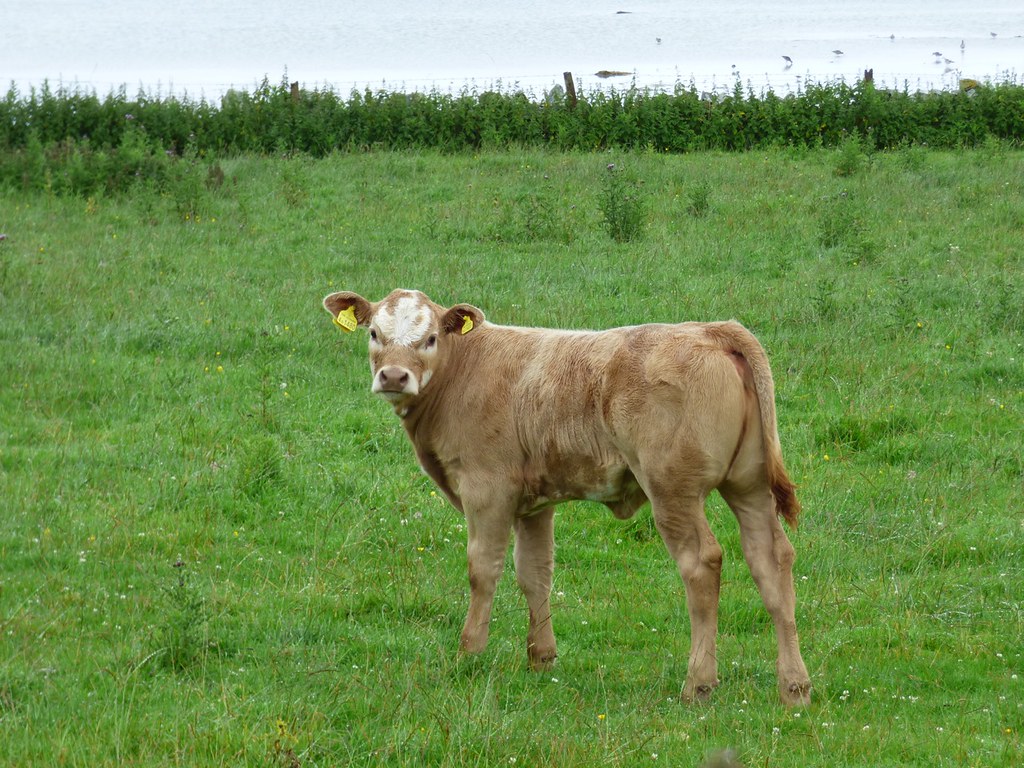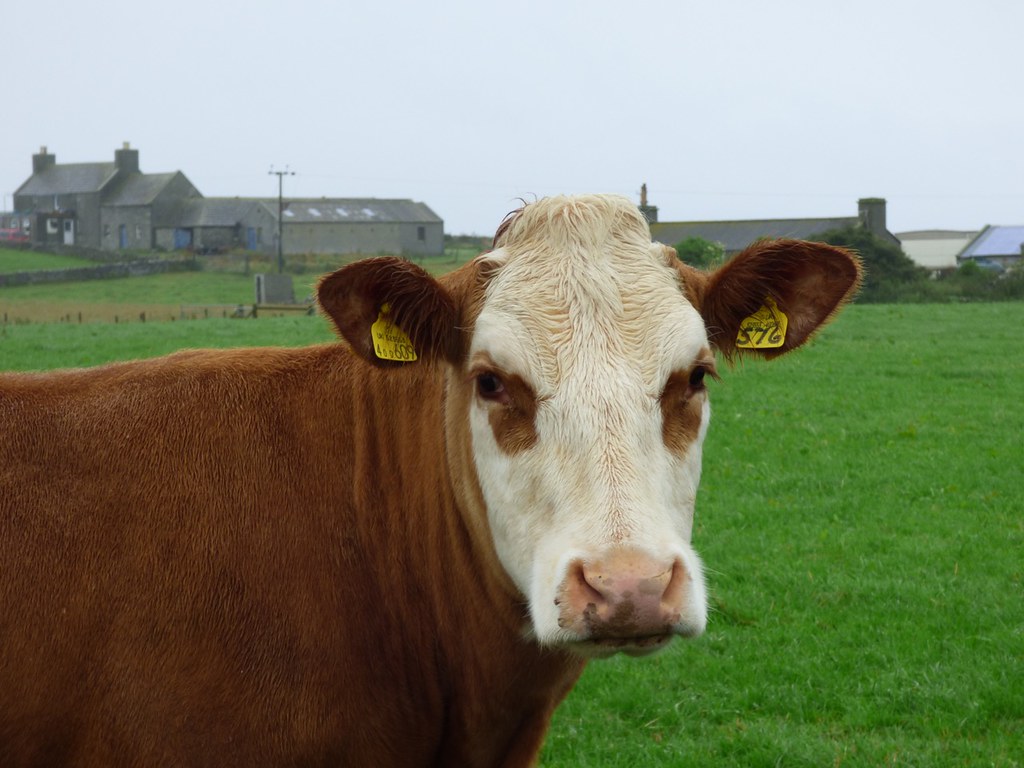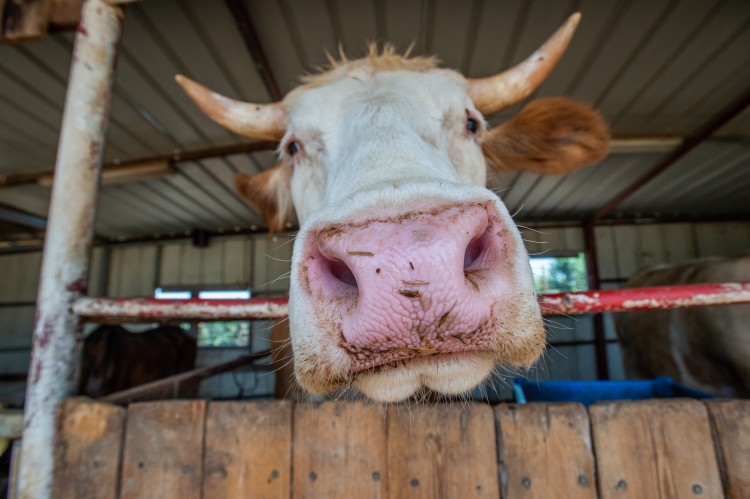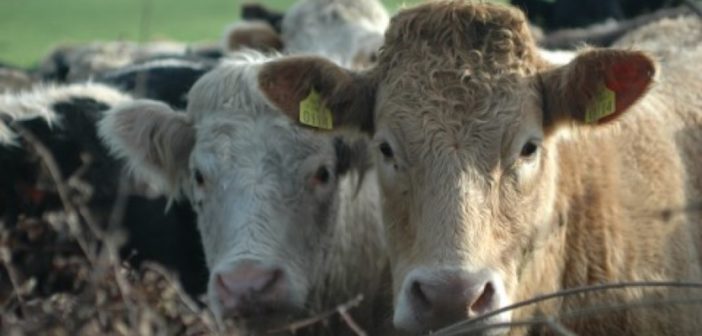It’s a dream scenario for vegans and animal rights activists: livestock farmers give it all up, retire their cows to sanctuary, transition to crop farming, and become advocates for animals and the environment. This almost unbelievable story is exactly what happened in 2017 when Jay and Katja Wilde decided enough was enough and that it was time to change everything on the cattle farm Jay inherited. It’s no wonder this inspired plenty of attention, including articles in the press and an award-wining documentary short.
For people who want animal agriculture to end, this kind of story is exciting and inspiring for several reasons. It proves that the change we want in the world is actually happening, and that the people we might imagine to be the most invested may actually want to walk away from business as usual. But what is that change actually like for the farmers, and what happens afterwards? If we want to see more animal farmers growing plants instead, we need to care about supporting them and making that transition as easy as possible.
In an interview with Jay and Katja Wilde, who own Bradley Nook Farm, we talked about their decision to give up livestock farming and what life has been like in the three years since then.
Dylan Forest: In the film 73 Cows, Jay called the process of sending cows he’d raised to slaughter “soul destroying.” Do you think many farmers who raise animals for meat feel conflicted about what they do in this way? Or is this a fairly rare reaction to doing this work?
Katja: We have heard of a number of farmers on small/medium farms who chose to not be around when the animals were loaded for transport to the abattoir, but usually the stories ring with a bit of condescension as if they are not “true” or “good” farmers.
Jay: I don’t know and can’t really guess how other farmers feel about raising animals for meat. But I suppose some at least must feel conflicted. Maybe they overcome their feelings as they feel they are producing food in a way that’s occurred for hundreds if not thousands of years.

I imagine that growing up in the world of animal farming, you’re raised to see animals in a more utilitarian way, and not as feeling individuals. How did you come to think differently about the animals in your care? Was it difficult to give up the ways you’d been raised to think of animals?
Katja: I did not grow up on a farm, but in a rural area like we live in here. I do remember going to the neighbor with my milk churn to fetch milk fresh from the tank while the cows were still being milked and being aware that they were tied up and never moved, let alone went to pasture. I had no confidant to vent the eerie feeling or I might have decided against meat much earlier.
I also think that utilitarian ideas about animals do not exclusively apply to farmers, but that our entire (Western?) society is affected by this.
Jay: I think when you work on a livestock farm there’s a continual process of birth and animals becoming mature either to produce milk or meat. You might ascribe personalities to some notable individuals but the number of animals involved, the continual turnover and the knowledge that deep attachment will ultimately be impossible makes it difficult to view them truly as individuals.
What was the hardest part of transitioning from animal to vegetable farming?
Katja: So far, dealing with all the rules and regulations that apply to farming here in Britain. As Hillside Animal Sanctuary offered to accommodate our herd within weeks of making the decision to let them go, and due to the proposed publicity, we had very little time to make plans and that has caused a lot of delays. I assume there will be backache and a very steep learning curve involved in future operations.
Jay: In our case, several factors made it difficult to transition. All of the farm is in some way protected, making it difficult to designate areas for vegetable growing. We have no knowledge of growing crops and need a lot of outside help, probably in the form of bringing in a knowledgeable grower to manage the new venture.
Do you think it would be helpful if animal farmers were encouraged to make the change you made and supported through that change? What do farmers need to feel like this change is possible, and what kind of support would be most helpful?
Katja: Yes, I think farmers need support in many ways. They need advice as to what their soil is capable of producing and how to go about it and business advice to make the transition into a viable undertaking. They also need support in dealing with the fact that they are leaving a large part of their identity by the wayside and will inevitably lose part of their community and encounter conflict with members of the farming community who feel threatened by someone raising all these issues. Rowdy Girl in the USA and The Vegan Society in the UK are offering support with these things.
Jay: We think it is essential that animal farmers are encouraged to start producing food for direct human consumption instead of keeping animals which are then used to provide food. This is important firstly to eliminate the inevitable cruelties that animal-based farming incurs and secondly to fight climate change and loss of habitat, which will be impossible without huge reductions in animal agriculture. Farmers need official government support and encouragement to make the change, with advice and financial support available only for animal-free agriculture.

I know your decision to cease farming cattle and to transition to vegan farming wasn’t always well-received by your community, particularly other farmers, and that your farm had the nickname “the funny farm” among neighbors. Now that it’s been three years since you sent your herd to sanctuary, has this changed at all? Do you still have relationships with animal farmers, and what’s your sense of how they think about your farm’s transition away from animal farming?
Katja: Yes, we still have relations with other livestock farmers. Some are very businesslike and just glad they can buy some of our hay (which will decrease in the future with reduced applications of manure). Some are supportive, as they are thinking along similar lines. Some who speak supportively in private will join in with the majority in groups and have since approached us with anti-vegan clichés about milking almonds. Others will listen to the development of our project and speak about their own issues, but the core topic of not engaging in killing animals and reducing the impact on the environment has never been discussed openly with any other farmer. In larger meetings regarding farming issues, snide remarks against vegans are commonplace and we have received angry looks going around town.
Jay: We don’t really know how other people feel about our decision at the moment. We do have contact with other organic farmers and whilst not being actively supportive, they do not voice criticism. This could be because they want to buy the organic hay we unfortunately still have to sell into the conventional farming system.
The most headline-grabbing part of the changes you made was your decision to send your entire remaining herd of cattle to an animal sanctuary. This must have been a difficult decision for a number of reasons, including its financial impact and what it meant symbolically in terms of your rejection of animal agriculture. How did it feel when you made that decision, and what were your reasons for making it?
Katja: I had not thought about it until the Vegan Organic Network asked what our plans were and Jay said it out loud. But it was the only logical solution or we would have had to build the new venture on a sell-out. It may have enforced the angry reactions, and we have also been accused of dumping our responsibility, both by farmers and vegans. In the grand scheme of the development of the farm, the moral support we have gained through sticking with our principles far outweighs the financial loss, and the prospects of our crowd funder are very positive as well.
Jay: Sending the animals to a sanctuary was suggested by The Vegan Society and they made the whole process possible. Far from being difficult, this was a liberating decision because we did not want the cows to be sold into conventional farming and ultimately suffer the same fate of all livestock at the abattoir. The removal of this personal conflict and guilt was immensely liberating for us and made it possible to think of a future where the farm could produce food in what we found to be a completely acceptable way regarding both ethics and sustainability.

You’ve been open about your farm’s story and have been interviewed in many news outlets and featured in a documentary. What did you hope to accomplish in sharing your story? Has being public about it been a positive thing for you overall?
Katja: The Vegan Society asked us to go public in order to start a discussion about the issues and that has clearly worked. I am happy about that. On the other hand, I feel a bit exposed, not least as judgement is clearly expressed and neither of us have been ideally equipped to deal with that. There is a phenomenon found on smallish British family farms that is called “rural isolation,” and that clearly applied to us prior to our decision.
Jay: We never had an agenda in sharing the story, we have just responded to interviews and questions like your own as they came along. Each escalation of interest was a genuine surprise to us, but in answering the questions and giving the interviews we began feeling the need to justify and explain why we feel the need to change. Only later, as we learned that people were being affected by our story, have we felt able to encourage others to make choices that they feel to be necessary but which are difficult because of expectations and the need to conform to norms, as well as to make changes that reduce their personal impact on everything they share the planet with.
What is going on at Bradley Nook Farm now, and what plans do you have for the future?
Katja: We are working towards setting up the infrastructure for the vegan organic growing business. We finally have all the necessary permits and soon we can start crowdfunding.
We are also working on the infrastructure to start producing oat milk under the guidance of Refarm’d, who are aiming to get dairy farmers to produce plant-based drinks to raise an income while keeping their livestock as sanctuary animals and slowly transitioning to non-livestock land use.
Jay: We were hoping to start producing vegetables this year, but due to unforeseen difficulties, not least COVID-19, important parts of the development have been delayed. We still hope to begin starting the growing process in 2021. Meanwhile the basic tasks on the farm remain as they always did, looking after the 17 cattle that are still living on the farm (they make very messy pets), making hay, and ongoing maintenance of very old and unreliable machinery.
The first animal-free enterprise on the farm will be producing an oat drink, which is expected to begin in a month or two’s time of writing. We hope to prove that the wildlife and habitat value of the farm can be improved over the years without the necessity of a commercial livestock enterprise. This is counter to the public message of farming organizations in this country, who say that reducing the number of livestock on farms would destroy the British countryside. We also hope to prove that our farm can produce much more food with a small area of crop growing than through devoting the entire farm to animal production.
Featured image: Irish cows. Image credit Kim Bartlett – Animal People, Inc.





